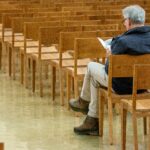Part of our annual My Year In… series
Life as a theology student is every reader’s dream. You have time, a library, and no actual responsibility.
This year I tried to read thematically (things about the same thing) and organically (following the footnotes to find the next thing). That made for equal parts discipline and adventure, and I think I’ll stick at it.
Books about Australia
2023 was my year of Australian history. Mostly out of millennial ignorance. But also—it’s not actually as boring as people say! Grace Karsken’s history of early Sydney in The Colony was a treat. Remarkable source material, beautiful and imaginative; if you want to see the first settlement with your mind then this is the one.
Reading James Boyce’s 1835 on the founding of Melbourne while on location was great. Did I know that my hometown of Perth was settled two years before it? Not at all. Same age, same income—very different cities.
Geoffrey Blainey’s two-volume The Story of Australia’s People was good. As per the title, though, he tends to eschew the big events in favour of the everyday.
Exploring Britain’s decision to colonise, Alan Frost’s Botany Bay had an interesting thesis. Think less “Hey let’s make a giant prison!” and more “Gents, let’s step it up with our strategy to destroy the French.”
On more recent history, Frank Bongiorno’s history of Australia through the 80s (The Eighties) was hands down my top read for the year. I have never tried hairspray or worn fluorescent pants, but thanks to Bongiorno I now feel like I have. Whether it was the Hawke years, shonky real estate or the America’s Cup—this book smashed it out of the park.
To cap it off, the Idea of Australia by Julianne Schultz was a little frustrating. As a reflection on national identity, it just felt unhelpfully partisan. At least she had wonderful prose.
Books about Theology
On to my mainstay of the Bible and there were two new books by the Jensen brothers this year. The Coming of the Holy Spirit (Philip) and The Life of Faith (Peter). Both are excellent, but I’ll play “parent” and pretend not to have a favourite child.
Sinclair Ferguson’s The Whole Christ got a third rotation this year. Ferguson is self-consciously trying to rework our faulty paradigms about God’s grace, and I just think it is as helpful and heartwarming as any Christian book can be.
If you’re a fan of authors like Peter Leithart or Alistair Roberts (which I am), but sometimes find them a tad experimental (which I also do)—enter James Hamilton’s Typology as a potential alternative. Hamilton says typology is the Bible’s way of building expectations of how God is going to save, and that—importantly—the Bible sets the limits for how we see it. As a primer for careful reading of the Old Testament, I find this pretty useful. Why he structured his book as a chiasm, however, I do not know. Safe to say it was a weird experience turning to the end of the book to read what should have been chapter two.
For something long and heavy, Matthew Barrett’s 1009-page tome, The Reformation as Renewal, was a lot of fun. As a one-stop shop for thinking about the intellectual history of 1517, this was an absolute weapon. Buy it. Read it. Do it. Love it.
Still, the only thing better than long books are short ones, and on that score Barry Cooper’s Can I Trust the Bible? and Gwilym Davies’ Application were both under 100 pages. Cooper’s approach is to ask us to trust the Bible on its own criteria before we subject it to our own. Simple, but the perfect anti-venom for those with modernist doubts. If anything, read it for its methods. Davies’ on the other hand just bangs one giant humungous drum: stop thinking you have to come up with a sermon application because the text already has one! In my opinion, Application serves as a helpful complement to read alongside Murray Capill’s The Heart is the Target.
Cooper’s approach is to ask us to trust the Bible on its own criteria before we subject it to our own.
Books about Everything Else
To cap it off with a few things miscellaneous: I picked up the classic Little Women on recommendation from my growth group, but it wasn’t for me; Alex Hutchinson in Endure completely changed how I thought about running; and starting Tom Holland’s trilogy on Ancient Rome was a lot of fun, even if occasionally harder going whenever I was standing on unfamiliar ground.
Timothy Keller: His Spiritual and Intellectual Formation was the only book I read in one sitting. Profound! And it made me think about who has influenced me and who I’ll apprentice myself to next.
Last but not least, Andrew Wilson’s Remaking the World: How 1776 Created the Post-Christian West on audiobook was superb. A sweeping account of the people and ideas that remade our world—everything from its scope, to its story, to its intrigue was brilliant. If there’s a book I wish I could write, it would be exactly this but called 1788.
That’s the list! College break is starting now: here’s to finally reading a novel by the beach.















